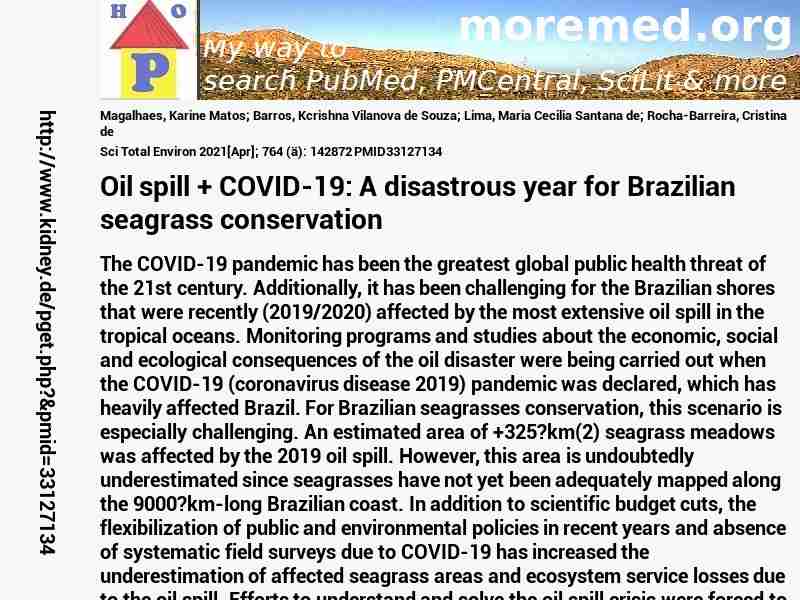
|
10.1016/j.scitotenv.2020.142872
http://scihub22266oqcxt.onion/10.1016/j.scitotenv.2020.142872

33127134!7568772!33127134
 free free
 free free
 free free
|  
Deprecated: Implicit conversion from float 229.6 to int loses precision in C:\Inetpub\vhosts\kidney.de\httpdocs\pget.php on line 534
Deprecated: Implicit conversion from float 229.6 to int loses precision in C:\Inetpub\vhosts\kidney.de\httpdocs\pget.php on line 534
Warning: imagejpeg(C:\Inetpub\vhosts\kidney.de\httpdocs\phplern\33127134.jpg): Failed to open stream: No such file or directory in C:\Inetpub\vhosts\kidney.de\httpdocs\pget.php on line 117
 Sci+Total+Environ 2021 ; 764 (�): 142872 Sci+Total+Environ 2021 ; 764 (�): 142872
Nephropedia Template TP
gab.com Text
Twit Text FOAVip
Twit Text #
English Wikipedia
|
Oil spill + COVID-19: A disastrous year for Brazilian seagrass conservation #MMPMID33127134Magalhaes KM; Barros KVS; Lima MCS; Rocha-Barreira CA; Rosa Filho JS; Soares MOSci Total Environ 2021[Apr]; 764 (�): 142872 PMID33127134show ga
The COVID-19 pandemic has been the greatest global public health threat of the 21st century. Additionally, it has been challenging for the Brazilian shores that were recently (2019/2020) affected by the most extensive oil spill in the tropical oceans. Monitoring programs and studies about the economic, social and ecological consequences of the oil disaster were being carried out when the COVID-19 (coronavirus disease 2019) pandemic was declared, which has heavily affected Brazil. For Brazilian seagrasses conservation, this scenario is especially challenging. An estimated area of +325?km(2) seagrass meadows was affected by the 2019 oil spill. However, this area is undoubtedly underestimated since seagrasses have not yet been adequately mapped along the 9000?km-long Brazilian coast. In addition to scientific budget cuts, the flexibilization of public and environmental policies in recent years and absence of systematic field surveys due to COVID-19 has increased the underestimation of affected seagrass areas and ecosystem service losses due to the oil spill. Efforts to understand and solve the oil spill crisis were forced to stop (or slow down) due to COVID-19 and the economic crisis, leaving ecosystems and society without answers or conditions to identify the source(s) that was/were responsible for this spill, mitigate the damage to poor communities, promote adequate impact assessment or restoration plans, or properly monitor the environment. Our results highlight that pandemic and large-scale environmental disasters may have had a synergistic effect on the economy (e.g., artisanal fisheries and tourism), public health and ecology, mainly due to government inaction, social inequality and poorly studied tropical ecosystems. The results of this study also demonstrate the need to analyze the short- and long-term impacts of the combined effects (oil spill + COVID-19) on the recovery of the economy and coastal ecosystems.|*COVID-19[MESH]|*Disasters[MESH]|*Petroleum Pollution[MESH]|Brazil[MESH]|Ecosystem[MESH]|Humans[MESH]|Oceans and Seas[MESH]|Pandemics[MESH]
  
DeepDyve
Pubget Overpricing | 
|